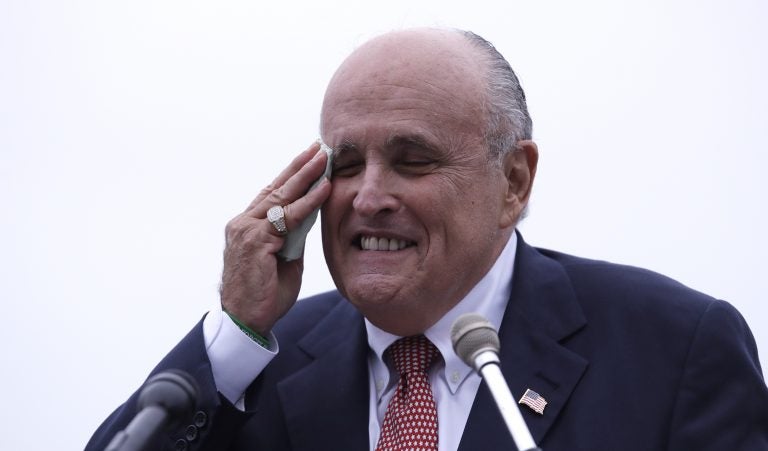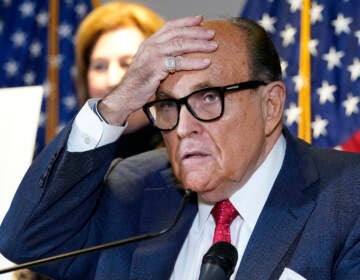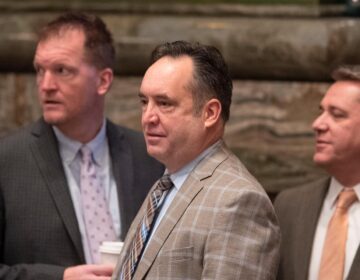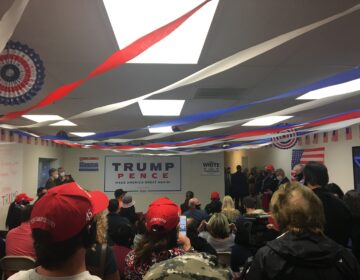Thank you, Rudy Giuliani, for confirming Trump’s core conflict of interest
It's a mystery why Team Trump keeps trotting out Rudy Giuliani to spin for Client-1. Every time he opens his mouth, he digs the hole deeper.

Rudy Giuliani, an attorney for President Trump, in Portsmouth, N.H., Wednesday, Aug. 1, 2018. (AP Photo/Charles Krupa)
It’s a mystery why Team Trump keeps trotting out Rudy Giuliani to spin for Client-1. Every time he opens his mouth, he digs the hole deeper.
In his latest public trifecta – CNN, “Meet the Press,” a chat with The New York Times – he essentially confirmed that Donald Trump, during the entirety of his campaign for president in 2016, was simultaneously trying to score a multi-million dollar business deal with a hostile foreign power. In other words, Trump indulged Russia on foreign policy (echoing Putin’s hostility toward NATO, calling for an end to economic sanctions against Russia, turning a blind eye to all evidence of pro-Trump election hacking) because he wanted Russian muscle and money to build a Moscow Trump Tower.
The Trump administration knew that this core conflict of interest was politically explosive. That’s why Michael Cohen, at the time still in toady mode, lied under oath to Congress in August ’17 when he insisted that the Trump company’s business negotiations with Russia ended in January 2016, on the eve of the Iowa GOP caucuses. That fake timeline was dumped when Cohen subsequently pleaded guilty to a charge of perjury; his revised claim, in court filings, was that the business negotiations with Russia continued through the entire GOP primary season, ending in June 2016.
Now comes Giuliani. He surfaced on the Martin Luther King holiday weekend to declare that the Tower negotiations probably didn’t end until November 2016. In an interview with The Times yesterday, he even quoted Trump as saying that the prospective business deal with Russia “was all going from the day I announced to the day I won” – and that, in Giuliani’s words, Trump had “a series of conversations” with Cohen about the status of the Russia deal while he was running for president (and taking stances that were soft on Russia). Giuliani said it again in CNN: “They had conversations about (the prospective deal) throughout 2015, 2016.”
All of which prompts a big question: Did Cohen lie under oath all on his own, when he told Congress that the Moscow Tower negotiations ended at the start of the GOP primary season? Or did Trump, or lawyers working for Trump, tell him to lie under oath? Last Thursday’s Buzzfeed bombshell story (which is being disputed by Robert Mueller’s office, at least with respect to its sourcing) says that Trump indeed told Cohen to lie. It’s hard to believe that Cohen would’ve lied on his own, given his servile track record, and Cohen’s lawyers wrote, in court documents last November, that Cohen’s conduct was always “intended to benefit Client-1 (Trump), in accordance with Client-1’s directives.”
Giuliani had two simple jobs yesterday: Attack the BuzzFeed News story (which he did, calling it “disgusting”), and distance Trump from the Moscow Tower negotiations (which he did, by claiming – this was hilarious – that the entire Moscow project was cooked up by Cohen). Giuliani also insisted that Cohen decided on his own to lie under oath.
But then, in true Rudy fashion, he proceeded to screw things up.
On CNN, Jake Tapper asked: “Did President Trump or anyone on the Trump team talk to Michael Cohen about his congressional testimony before he gave congressional testimony, or after he gave congressional testimony?” Giuliani’s response was quintessentially foggy:
“I wasn’t the lawyer at the time…As far as I know, President Trump didn’t have discussions with him…I don’t know if it happened or didn’t happen…I have no knowledge…I wasn’t there.”
Then came his piece de resistance. Having just acknowledged that the potential target of a federal investigation (Trump) may indeed have conferred with a federal witness in advance of the latter’s sworn testimony, Rudy retreated to the last line of defense: Trump conferring with Cohen in advance of Cohen’s testimony “would be perfectly normal…So what if he talked to him about it?”
We’re already familiar with the “So What” Defense. First, the Trump people said that none of them had any backdoor dealings with Russia in 2016. When that lie was exposed, they said there was no “collusion” (the precise word, in the federal criminal code, is “conspiracy’). And when evidence of conspiracy began to mount, they insisted “so what?” They claimed that even if there was evidence of conspiracy, it was really no big deal.
We may or may not learn whether Trump may have told Cohen to lie under oath about the timeline of the Moscow Tower project (BuzzFeed News says yes, and it’s standing by its story), or whether Cohen knew from long experience that lying for Trump was a given. But Rudy, bless his heart, said something else yesterday that was inadvertently insightful. He told The Times that when Cohen lied to Congress, claiming that the Moscow project ended in January 2016, Trump simply “accepted” that statement.
In other words, Trump, as president, never sought to correct the record. He never informed Congress that his lawyer’s August ’17 statements were false. Bottom line: He perpetuated the coverup of his conflict of interest with Russia, the campaign ’16 conflict where he pulled his punches on Russia in the hopes of lining his pockets via Russian money and muscle.
Thanks, Rudy! What else you got for us?
—
Bonus fun: My piece in The Atlantic about Rudy, posted last September.
WHYY is your source for fact-based, in-depth journalism and information. As a nonprofit organization, we rely on financial support from readers like you. Please give today.




